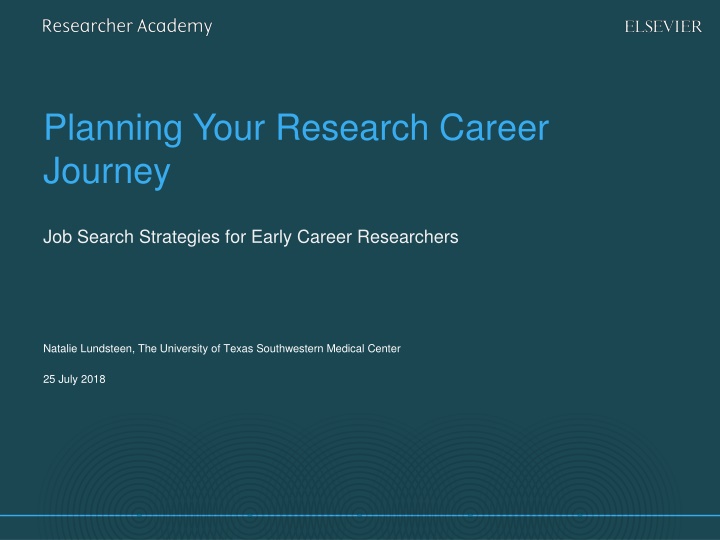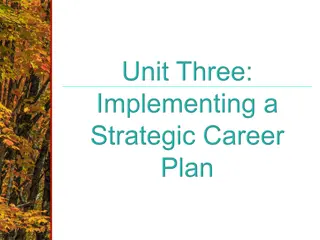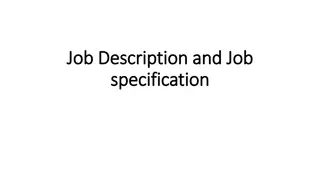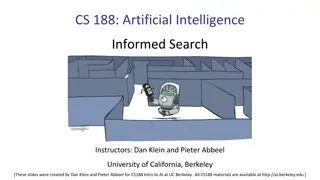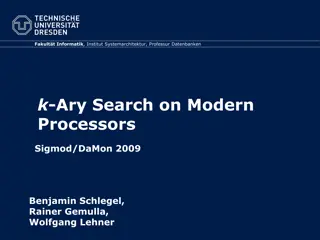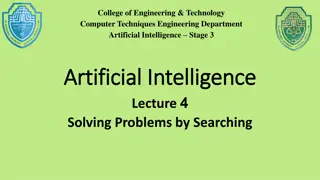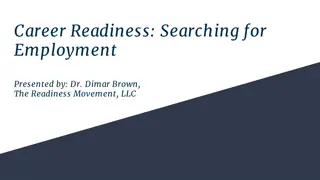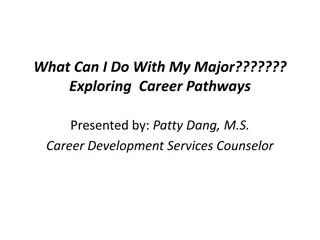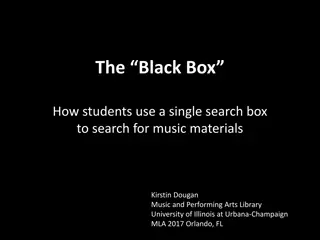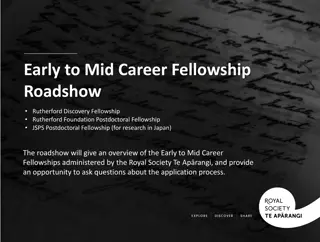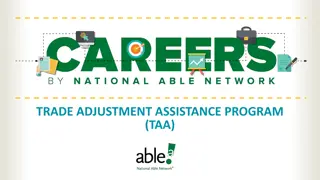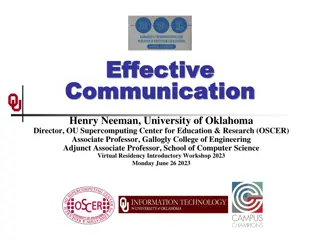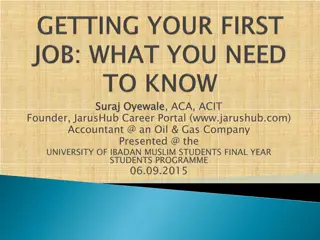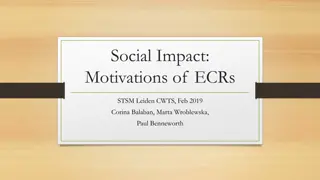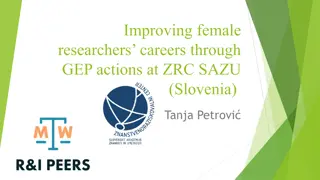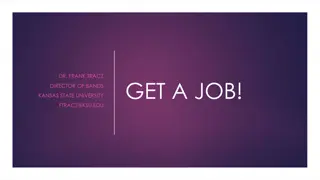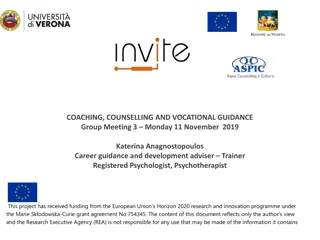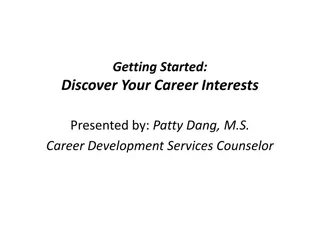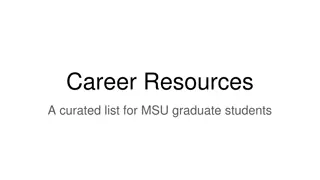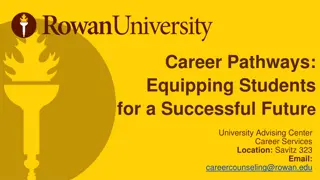Effective Job Search Strategies for Early Career Researchers
Explore insightful tips from Natalie Lundsteen on career planning and job search strategies for early career researchers. Learn about self-assessment, research alignment, and networking skills crucial for a successful research career journey.
Download Presentation

Please find below an Image/Link to download the presentation.
The content on the website is provided AS IS for your information and personal use only. It may not be sold, licensed, or shared on other websites without obtaining consent from the author.If you encounter any issues during the download, it is possible that the publisher has removed the file from their server.
You are allowed to download the files provided on this website for personal or commercial use, subject to the condition that they are used lawfully. All files are the property of their respective owners.
The content on the website is provided AS IS for your information and personal use only. It may not be sold, licensed, or shared on other websites without obtaining consent from the author.
E N D
Presentation Transcript
Planning Your Research Career Journey Job Search Strategies for Early Career Researchers Natalie Lundsteen, The University of Texas Southwestern Medical Center 25 July 2018
About the speaker 20+ years working in research institutions as a faculty member and advisor to students, postdoctoral researchers, and alumni Global experience at Stanford University, University of Oxford, Massachusetts Institute of Technology, The University of Texas My career path gradually shifted to where I exclusively provide advising and support for graduate students and postdocs Current focus population: biomedical science PhDs Co-authored ReSearch: A Career Guide for Scientists (Elsevier, 2017) My own research interests are in the development of professional expertise. I am curious about how individuals become successful in their workplace, and how they choose those workplaces | 2
What we will cover today Career planning as an ongoing process Things to consider during your job search Developing your job search methods, including communication and networking skills | 3
The career development process Most people think it starts at the top but it really starts here! | 4 Credit: Peter Fiske
Job search strategy: things to consider Understand self and personal factors Understand viable occupations and organizations Be thoughtful, undertake research on both self and workforce Don t leap before you look | 5
Typical career search questions researchers ask: How do I get a job in ________? Can you get me a job in ________? How do I write a CV? What career paths fit my research expertise? Who s hiring? | 6
Better questions to ask: What do I enjoy doing? What am I good at doing? What are various career paths really like? What career paths and organizations are the best fit for my skills and interests? Do I even know my own skills and interests? Where would I be most happy at work? | 7
Why are these questions better? Researchers are often set on matching domain expertise to a career and ignore other important career choice factors Researchers lack exposure to fields beyond their own discipline and the academic research environment Career thinking for researchers is difficult Lack of established pathways Fear/anger about years of research work for nothing Fear/lack of knowledge about different environments Steep learning curve, but luckily researchers are very good at learning and research! | 8
Planning the career journey Understand that your career search will be both quantitative (understanding your career options) and qualitative (determining careers where you will best fit) Assess all aspects of potential career paths and know your own preferences before preparing to apply Understand the importance of putting together both self-knowledge *and* career path knowledge | 9
Whats next in your career? Do I need a job NOW, or do I have time to look? Do I want academia? Maybe? Do I have a backup plan? What options are possible for my individual situation? Will visa status impact my search? Does anyone else have a stake in my career decision-making? | 10
First consideration: types of research jobs First, think about how research fits in to your career plan Next, consider your personal career (and personal) goals More on this later! Begin exploring career path options VersatilePhD Biocareers (for life scientists) My IDP (Science careers) ImaginePhD (for humanities and social scientists) Professional associations LinkedIn or other alumni databases Google/other search engines (not the best tool but worth a try) | 11
What search parameters exist for you? Do you have a target market? Are there sufficient job opportunities in your target market? How about a geographical preference? Timing constraints? What size organization is right for you? Have you considered working environment, workplace atmosphere, and organizational culture? What kind of people do you enjoy working with? Which of these parameters is non-negotiable (if any)? What resources do you need to be able to answer these questions? | 12
Second consideration: Personal Assessment Four major components to career self-assessment Skills Interests Personal characteristics Values | 13
Skills (i.e. What am I good at doing?) Skills describe your ability to perform a task They are portable (such as: analyzing, managing) Don t confuse skills with experience Experience is usually expressed as a descriptor/label attached to a specific job, such as Director or Supervisor Experience is not always portable; context matters Assess your skills using MyIDP or ImaginePhD | 14
What skills do employers seek? Ability to work in a team structure Ability to communicate verbally (both internally and externally) Ability to make decisions and solve problems Ability to obtain and process information Ability to plan, organize, and prioritize work Ability to analyze quantitative data Technical knowledge related to job Proficiency with computer software programs Ability to communicate in written form Ability to influence others | 15
Interests (i.e. What do I enjoy doing?) What subject areas fascinate and absorb your attention? What careers have you considered throughout your life? What would you do if you knew you would NOT fail? Assess your interests using MyIDP, ImaginePhD, or keeping a list over time | 16
Personal characteristics (i.e. What makes you unique?) Your personal traits enhance your ability to perform certain tasks successfully in the workplace How would you describe yourself? How would others describe you? What are your strongest characteristics? Assess traits in conversation with family, friends and colleagues, or by using Gallup StrengthsFinder | 17
Values (i.e. What is important to me?) Values give our lives meaning and purpose Values are often sources of workplace conflict Changing life circumstances may affect our values Many people value careers based on economic reward (it s okay!) Assessing your values is a personal process | 18
Put it all together and get started Try and have your top 3 skills, interests, personal traits and values in mind as you begin your career search Before embarking on a career journey, consider: What is going on in your life? What is the catalyst for action? Are you mentally prepared? If considering a career change/pivot, be sure to understand all that is needed to make such a major move Do you have the capacity (time, resources) for undertaking this career search? | 19
Establish professional objectives You know about yourself, as well as the research career paths Now, imagine the destination: create some basic SMART goals Specific Measurable Achievable Realistic Timely | 20
Sample research career search SMART goal Specific I need a job within six months, preferably as a project manager Measurable I will attend the ___ conference in August and call/email three new contacts after the meeting I will create a contact list of everyone I know in Lithuania Achievable I will send ten CVs per day (no, not a SMART goal) Realistic I see at least three postings per week in my city, and know of 15 firms (Depends on your situation and the research you have done on your target market) Timely Also depends on your situation but be realistic! Set regular milestones, Gantt charts | 21
Some notes on research career search timing Eighteen months the ideal timeframe. Three-six months possible. Consider the ratio of one month of searching to every $10k sought in salary (this is not a fact, just a guideline!) Stay aware of academic (or other) job market cycles Being intentional with your plans and actively focusing your career search will shorten the duration Five to ten minutes per day can be effective Be patient, stay as positive as possible Consider options if you can t land the perfect job right away Temporary work; recruiters | 22
Final practical advice for the research career search Set up informational chats whenever possible Contacts lead to contacts, but be polite and diplomatic 70-90% of all jobs are not posted In academia, posted jobs result in hundreds of applicants, how will you not be lost in the shuffle? Tailor your materials to each application Maintain a good tracking system (for both your applications and your contacts) Practice your interviewing skills well in advance of being asked to interview | 23
